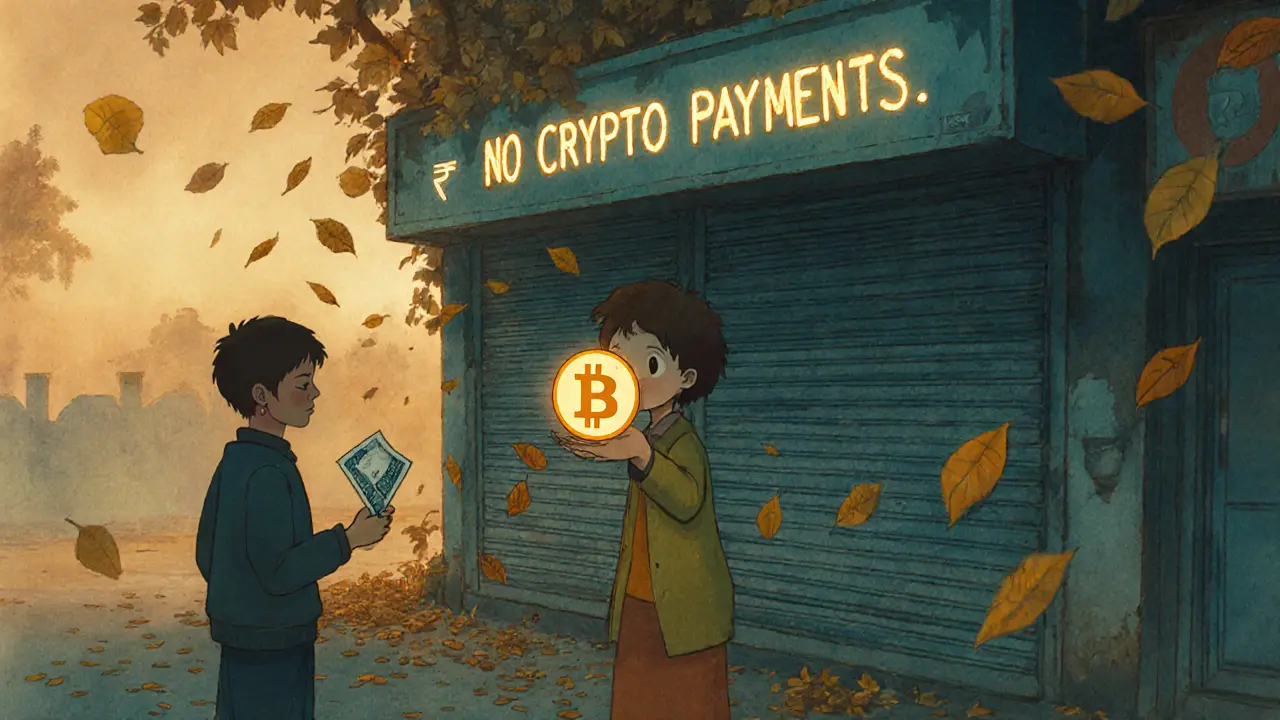India Crypto Tax Calculator
30% tax rate on capital gains applies to all crypto transactions.
1% TDS on trades over ₹50,000.
Must report in Schedule VDA of ITR-2/ITR-3.
Tax Calculation Results
Can you use Bitcoin or Ethereum to pay for groceries, rent, or a ride in India? The short answer is no. As of 2025, using cryptocurrencies to pay for goods or services is explicitly illegal in India. But here’s the twist: buying, selling, and holding crypto is still perfectly legal. The government didn’t ban crypto-it just drew a hard line at using it as money.
Why Can’t You Pay With Crypto in India?
India doesn’t treat cryptocurrencies like the Indian Rupee. They’re not legal tender. That means no business, online store, or street vendor is allowed to accept Bitcoin, Dogecoin, or any other crypto as payment. Even if you and the seller agree to it, the law doesn’t recognize the transaction as valid. This isn’t about distrust in the tech-it’s about control. The government wants to keep financial transactions traceable, taxable, and tied to the rupee. The legal basis comes from the Income Tax Act, where crypto is classified as a Virtual Digital Asset (VDA). That label tells you everything: crypto is treated like a stock or gold, not cash. You can own it, trade it, even hold it for years-but you can’t spend it like rupees.What You Can Do With Crypto in India
Even though you can’t pay with it, crypto is far from dead in India. Millions still trade it. Exchanges like WazirX, CoinSwitch Kuber, and ZebPay are still operating, and they’re not shady backrooms-they’re registered with the Financial Intelligence Unit (FIU-IND). To stay legal, they must follow strict rules:- Know Your Customer (KYC) checks for every user
- Report all transactions over ₹50,000
- Keep records for at least 7 years
- Pay taxes on every profit
How the Tax System Works (It’s Harsh)
The government didn’t just ban crypto payments-they made sure trading comes with a heavy price tag. Since 2022, every profit from crypto is taxed at a flat 30%. No deductions. No offsetting losses. If you bought Bitcoin at ₹500,000 and sold it at ₹700,000, you owe ₹60,000 in tax on the ₹200,000 gain. That’s it. No expense write-offs, no capital loss carryforwards. On top of that, there’s a 1% Tax Deducted at Source (TDS) on every trade over ₹50,000. So if you sell ₹100,000 worth of crypto, ₹1,000 gets taken out before you even see the money. And if the exchange charges you a fee? That fee is now subject to 18% GST. You must report all crypto activity in your income tax return using Schedule VDA in ITR-2 or ITR-3. Missing this can trigger notices, penalties, or even your entire return being rejected. Many traders have lost refunds simply because they forgot to file this one form.
Who’s Watching? The Regulators
India doesn’t have one crypto regulator-it has three, and they don’t always agree. The Reserve Bank of India (RBI) still calls crypto a threat to financial stability. They’ve been pushing their own digital currency, the digital rupee (e₹), since 2022. Unlike Bitcoin, the digital rupee is issued by the RBI, backed by the government, and fully traceable. It’s meant to replace cash and reduce reliance on private crypto. The Ministry of Finance handles the tax rules and drafted a bill to ban private cryptocurrencies. That bill has been sitting in Parliament since 2023, never introduced. Why? Because the government isn’t sure if it wants to ban crypto entirely or just control it. Meanwhile, SEBI-the stock market regulator-has quietly signaled it’s open to regulating crypto like securities. They’ve suggested crypto exchanges should be licensed and supervised like brokers. That could mean a future where crypto trading is allowed, but only under strict, government-approved platforms. The FIU-IND has already fined big names. Binance paid ₹18.8 crore. Bybit paid ₹9.2 crore. Both were fined for failing to report suspicious transactions. Now, both are registered. That’s the message: comply, or pay.What Happens If You Try to Pay With Crypto Anyway?
Let’s say you find a local shop owner willing to take Bitcoin for your monthly rent. You send the coins. They cash out on WazirX. Sounds harmless, right? It’s not. The shop owner is now liable for 30% tax on the value of the Bitcoin they received. If they didn’t report it, they’re hiding income. That’s tax evasion. You, as the payer, are facilitating an illegal transaction. Both parties could face penalties, interest, or even criminal charges under the Prevention of Money Laundering Act. Even if you use a peer-to-peer app like Paxful to pay someone, the transaction leaves a digital trail. Exchanges report to FIU-IND. Banks flag unusual activity. The system isn’t perfect-but it’s watching.








Becky Shea Cafouros
November 15, 2025 AT 12:29 PMSo let me get this straight - you can buy Bitcoin like it’s a collectible trading card, but you can’t use it to buy a burrito? That’s not regulation, that’s just weird.
sandeep honey
November 17, 2025 AT 10:38 AMIn India, we’ve seen this movie before. Remember the cash crunch in 2016? They said demonetization would kill black money. It just made people smarter. Now crypto’s the new black money - and the government’s scared it can’t control it. They’re not banning crypto, they’re banning freedom.
Every rupee you spend is tracked. Every UPI transaction is logged. Now they want the same for crypto. Fine. But don’t pretend it’s about taxes. It’s about power.
I’ve paid my chaiwallah in USDT. He converted it on his phone. No one got fined. No one got caught. The system’s broken, not the people.
Sara Lindsey
November 17, 2025 AT 13:17 PMY’all are overcomplicating this. Crypto isn’t money here - it’s an asset. Like gold. Like land. You don’t pay for groceries with your gold necklace, do you? You sell it first. Same deal.
Stop crying about ‘freedom’ and start treating crypto like an investment. Buy low, sell high, pay your taxes, and move on. The system’s annoying, yeah - but it’s not evil.
And when the digital rupee drops? You’ll be glad you didn’t fight it. Just adapt. Life’s too short to rage against a system you can’t win.
Drew Monrad
November 17, 2025 AT 14:29 PMTHEY’RE LYING TO YOU. EVERY SINGLE WORD. This isn’t about control - it’s about fear. The RBI is terrified that if people realize crypto is better than their broken banking system, they’ll abandon the rupee entirely. So they slap a 30% tax on it like it’s a sin and call it ‘regulation’.
And don’t even get me started on the digital rupee. It’s not money. It’s a surveillance tool with a UI. They’ll know when you bought milk. When you kissed your partner. When you cried because your cat died. All tracked. All logged. All sold to advertisers.
They call it ‘financial stability.’ I call it digital serfdom. And if you’re okay with that, you’re not just naive - you’re complicit.
Mandy Hunt
November 19, 2025 AT 01:32 AMthe digital rupee is a backdoor to track everything you buy and who you talk to. the government already has your phone number your bank account your face on aadhaar now they want your crypto history too. they dont care about taxes they care about control. you think theyre worried about money laundering? no. theyre worried about people organizing. theyre worried about you realizing you dont need them. this is not about finance. this is about power. and they will crush anyone who tries to escape it. dont be fooled. the digital rupee is the end of privacy. and theyre calling it progress.
Cody Leach
November 19, 2025 AT 07:08 AMI think the 30% tax is brutal but fair if you’re making profits. You’re not paying for groceries with crypto because it’s volatile and unregulated - not because the government hates innovation. The digital rupee isn’t evil - it’s just a better version of what we already have. UPI works. It’s fast. It’s cheap. Why reinvent the wheel with something that’s harder to tax and trace?
If you want to invest in crypto, go for it. Just don’t pretend it’s a currency. It’s not. And pretending it is just makes you look like you don’t understand money.
David Cameron
November 19, 2025 AT 14:02 PMWhat’s money anyway? A shared hallucination backed by force. The rupee is a promise. Bitcoin is a protocol. The digital rupee is a promise written in code - and the state holds the key.
India isn’t banning crypto. It’s redefining value. The question isn’t whether you can pay with Bitcoin. The question is - do you still believe money should be a tool of control? Or a tool of liberation?
Maybe the real crime isn’t using crypto to buy groceries. Maybe it’s believing that the state has the right to decide what you can own.
anthony silva
November 20, 2025 AT 16:18 PMso you can buy crypto but cant spend it like money but you have to pay 30 tax on it and 1 percent tds and gst on fees and now theyre pushing a digital rupee that tracks everything and you think this is normal
yeah sure. i believe you. next youll tell me the sun is a ball of gas and not a giant flashlight in the sky
Kandice Dondona
November 22, 2025 AT 13:47 PMLove how this post breaks it all down so clearly 💙 I’ve been holding crypto for years and honestly, I get it - if you want to spend, use UPI. If you want to grow, hold crypto. No need to fight the system, just work within it.
And to everyone panicking about the digital rupee - I get it. But remember, the rupee isn’t going anywhere. The digital version just makes payments faster, cheaper, and more inclusive. For millions in rural India, this could be life-changing.
It’s not about control. It’s about access. We can have both innovation and inclusion. We don’t have to choose one over the other. Let’s keep building - not burning.